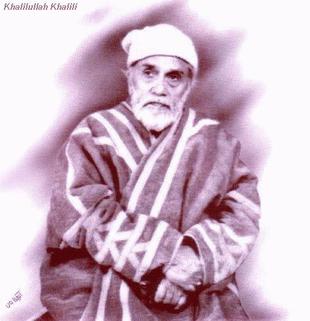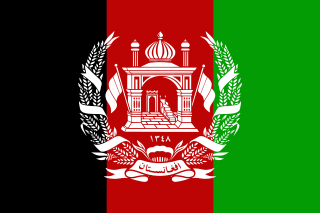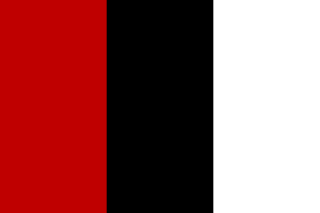
Ghazi Amanullah Khan was the sovereign of Afghanistan from 1919, first as Emir and after 1926 as King, until his abdication in 1929. After the end of the Third Anglo-Afghan War in August 1919, Afghanistan was able to relinquish its protected state status to proclaim independence and pursue an independent foreign policy free from the influence of the United Kingdom.
Sher Khan or Shir Khan may refer to:

Khalilullah Khalili was Afghanistan's foremost 20th century poet as well as a noted historian, university professor, diplomat and royal confidant. He was the last of the great classical Persian poets and among the first to introduce modern Persian poetry and Nimai style to Afghanistan. He had also expertise in Khorasani style and was a follower of Farrukhi Sistani. Almost alone among Afghanistan's poets, he enjoyed a following in Iran where his selected poems have been published. His works have been praised by renowned Iranian literary figures and intellectuals. Many see him as the greatest contemporary poet of the Persian language in Afghanistan. He is also known for his major work "Hero of Khorasan", a controversial biography of Habībullāh Kalakānī, Emir of Afghanistan in 1929.
Hajii Sher Alam Ibrahimi was the governor of Ghazni Province from around 2005–2006 until 2007 and is a major commander aligned with Ittihad-i Islami and Abdul Rasul Sayyaf, having fought with him in the Afghan Civil War.

Ajab Shir County is in East Azerbaijan province, Iran. Its capital is the city of Ajab Shir.
The Ministry of Foreign Affairs of the Islamic Emirate of Afghanistan (MoFA) is the cabinet ministry responsible for managing the foreign relations of Afghanistan.
The following lists events that happened during 1927 in Afghanistan.
The following lists events that happened during 1928 in Afghanistan.
The following lists events that happened during 1929 in Afghanistan. The Afghan Civil War continued from the previous year.
Ajab Shir, also Romanized as ‘Ajab Shīr; also known as Ajabshahr, is a city in the Central District of Ajab Shir County, East Azerbaijan province, Iran, serving as capital of both the district and the county. The city's population is Azerbaijani.

The Kingdom of Afghanistan was a monarchy in Central Asia that was established in 1926 as a successor state to the Emirate of Afghanistan. It was proclaimed by its first king, Amanullah Khan, seven years after he acceded to the throne. The monarchy ended in the 1973 Afghan coup d'état.

Mohammad Nadir Shah was King of Afghanistan from 15 October 1929 until his assassination in November 1933. Previously, he served as Minister of War, Afghan Ambassador to France, and as a general in the Royal Afghan Army. He and his son Mohammad Zahir Shah, who succeeded him, are part of the Musahiban.
Sirdar Shir Ahmad Sura-i-Milli served as Prime Minister of the Kingdom of Afghanistan from October 25, 1927, to January 1929. He was succeeded by Shir Giyan after being deposed. He was born circa 1885.

Amir Ali Ahmad Khan, Shaghasi was an Afghan king from the Shaghasi family of the Barakzai tribe who was declared king of Afghanistan twice in 1929. He was first declared amir of Afghanistan by an influential cleric, Naqib Sahib on 20 January 1929, in eastern Afghanistan, but was defeated by Kalakani at Jagdalak on 19 February 1929. He was also declared as the amir of Afghanistan for the second time on 23 June 1929 in Kandahar, Afghanistan, by another highly influential Mufti Abd. Wasi Kandahari, but was defeated and captured by Kalakani on 3 July 1929.

Michal Shir Segman is an Israeli politician. She is currently a member of the Knesset for Yesh Atid, having previously served as an MK for New Hope from 2021 to 2022 and for Likud between 2019 and 2020.
The Chief of Staff of the Armed Forces is the highest-ranking military officer in the military of Afghanistan, who is responsible for maintaining the operational command of the military.

The Emirate of Afghanistan was an unrecognized state ruled by the Saqqawists that existed from January to October 1929. Habibullāh Kalakāni became the state's only emir on 18 January 1929. After the fall of Kalakāni on 13 October 1929, the Emirate ended.
Shir Muhammad-bek Gazi, also known as Mahmud-Bek also known under the nickname Korshirmat was a prominent figure of the Basmachi Movement in exile since 1923, the first head of the Turkestan Union during the Great Patriotic War with the support of the Abwehr to restore the insurrectionary movement in Turkestan.







